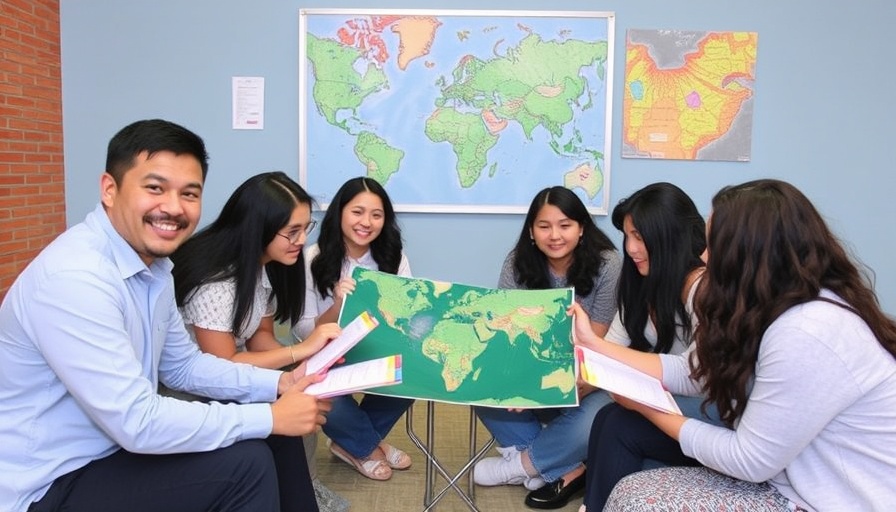
Embracing a Binational Future for Students
The border between the United States and Mexico is more than just a line on a map; it represents a unique opportunity for education that is increasingly being recognized by institutions such as the University of San Diego (USD) and Southwestern College (SWC). Located in San Diego, these colleges are harnessing their geographical advantage to build strong binational education programs. As they deepen their partnerships with Mexican institutions, the benefits extend beyond improved academic offerings—they also bolster the local economy, foster cultural exchange, and promote community pride.
Strengthening Ties with CETYS Universidad
One of the most visible collaborations has been between USD and CETYS Universidad, culminating in the graduation of a pioneering cohort in their Double Degree Program. This initiative allows students from CETYS to earn both a Master in Business Administration (MBA) and a Master of Arts in Leadership Studies from USD. This blended educational approach, lasting between 18 months to two years, reflects not only a rigorous academic standard but also a commitment to preparing graduates for success in a binational context.
Antonio Jiménez-Luque, Academic Director and Professor at USD, emphasized the cultural significance of such partnerships, stating, "This combination of an MBA with leadership studies highlights the fluidity and interconnectedness of our cultures across the border—important qualities for students who wish to navigate today’s globalized workforce." Such initiatives enhance the educational landscape, making it more inclusive and enriching.
New Opportunities for Student Exchanges
In another significant move, the renewal of the Memorandum of Understanding (MOU) between Southwestern College and Universidad Autónoma de Baja California (UABC) promises to elevate the student exchange experience. This agreement allows for the continued exchange of students and faculty, coupled with an exciting new provision enabling Mexican students to pay in-state tuition while taking courses at SWC directly.
Silvia Cornejo, SWC's VP of Academic Affairs, articulated the importance of these partnerships: "We know that our community is really a transborder, binational community. So we want to celebrate and support that, because it benefits the community as a whole." Such initiatives are crucial as they break down barriers traditionally faced by students seeking a higher education across borders, making learning more accessible.
The Economic Impact of Binational Education
Experts believe that enhanced collaboration between educational institutions in California and Mexico could have significant economic repercussions. Deepening these ties could bring about increased enrollment numbers and a subsequent boost to local economies. Additionally, stronger educational connections contribute to a more skilled workforce, which is essential for sectors that rely on cross-border trade, including technology, healthcare, and manufacturing.
Furthermore, as both nations face shared challenges and opportunities related to immigration policies and trade agreements, educational collaborations can play a key role in fostering a more united region that benefits both the U.S. and Mexico. By investing in the future of students on both sides of the border, local colleges are not just preparing graduates for jobs; they are cultivating leaders who will navigate and shape this increasingly interconnected world.
Future Insights: Where Do We Go From Here?
As binational education continues to evolve, stakeholders must stay agile, adapting to both educational demands and changing political landscapes. Future predictions indicate that such partnerships may become more critical as economic and social dynamics between the U.S. and Mexico shift. Institutions that apply innovative teaching methods and embrace cross-border learning will likely lead the way in creating effective educational experiences.
There’s a growing recognition of the need for flexible programs that respond to industry needs and student interests. With advances in technology, online courses may complement traditional education models, creating opportunities for broader involvement. This combination could further enhance accessibility, enabling students from various socio-economic backgrounds to engage in academic pursuits that once felt beyond their reach.
Conclusion: Join the Conversation
As we look toward the future, it’s crucial for community members, educators, and local businesses to engage with these evolving educational frameworks. The potential for growth and innovation driven by binational education is vast. By fostering open dialogue and collaboration between institutions, we can support a more equitable educational landscape that serves all members of our communities.
Those living in and around Bakersfield and beyond should keep an eye on these developments, as they herald a new era of opportunity for students, educators, and the surrounding communities. Consider how these partnerships may affect you, your friends, and your family. Together, we can pave the way for a brighter future.
 Add Row
Add Row  Add
Add 



Write A Comment